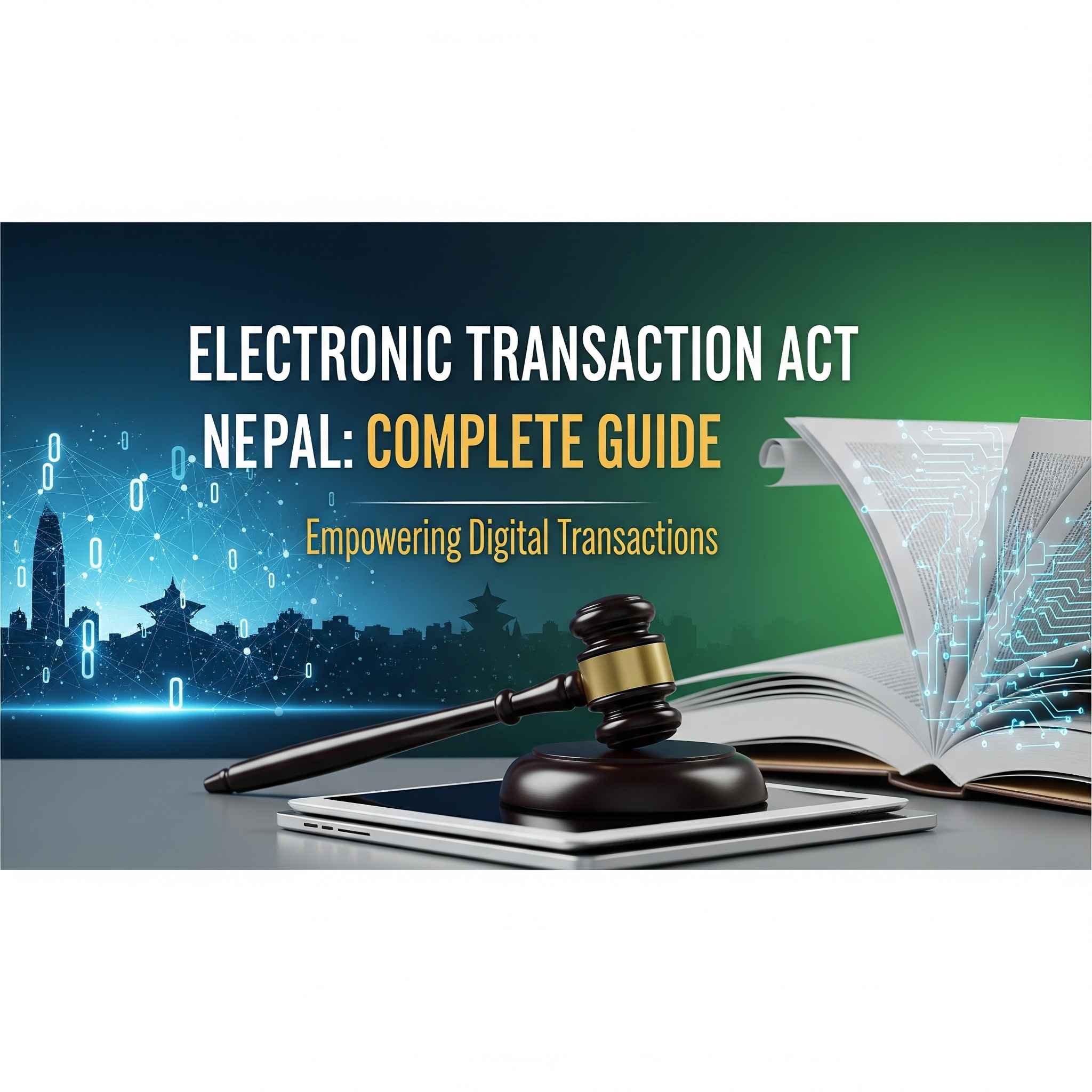Table of Contents
The Electronic Transaction Act Nepal represents the cornerstone of Nepal’s digital legal framework, establishing the foundation for electronic commerce, digital governance, and cybersecurity in the country. Enacted in 2063 (2008), this pioneering legislation has transformed how Nepal cyber law approaches digital transactions, providing legal recognition to electronic documents and creating mechanisms to combat cybercrime.
What is the Electronic Transaction Act Nepal?
The Electronic Transaction Act Nepal, officially known as the Electronic Transactions Act, 2063 (2008), is Nepal’s first comprehensive cyber law that governs digital transactions, electronic records, and cybercrime-related offenses. This landmark legislation was introduced to ensure the reliability and security of electronic transactions while controlling unauthorized use of electronic records or alterations through illegal means.
Key Objectives of the Electronic Transaction Act Nepal:
- To provide legal recognition to electronic records Nepal and digital signatures
- To create a secure environment for electronic commerce and communication
- To prevent and penalize cybercrimes including unauthorized access and hacking
- To promote e-governance and digital transformation in Nepal
- To facilitate online business activities through regulated electronic data exchange
Historical Background and Implementation
The Electronic Transaction Act Nepal received authentication on December 8, 2006 (22 Mansir 2063) and was deemed to have commenced from September 2, 2006 (24 Bhadra 2063). This retroactive application demonstrates the government’s commitment to establishing a legal framework for Nepal’s growing digital economy.
Where is the Electronic Transaction Act Nepal applicable?
- Throughout Nepal
- To any person residing anywhere who commits offenses under the Act
- To government bodies, businesses, and individuals engaged in digital communication
Education Consultancy Registration in Nepal
Key Provisions of the Electronic Transaction Act Nepal
Legal Recognition of Electronic Records
The Electronic Transaction Act Nepal establishes that electronic records have the same legal validity as physical documents. According to Section 4 of the Act, where prevailing laws require information to be kept in written or printed form, electronic records maintained according to the Act’s procedures shall also have legal validity.
Requirements for Valid Electronic Records:
- Must be maintained in electronic form
- Must fulfill procedures stipulated in the Act or related Rules
- Must be accessible for future reference
- Must be capable of being reproduced in readable form
Digital Signature Nepal: Legal Framework
The Electronic Transaction Act Nepal provides comprehensive provisions for digital signature Nepal recognition, making them legally binding equivalents of handwritten signatures.
What constitutes a valid digital signature under Nepal law?
- Must be created using asymmetric crypto system and hash function
- Must be unique to the signatory
- Must be capable of verifying the signatory’s identity
- Must be linked to the electronic record in such a way that any alteration is detectable
Digital Signature Certificate Process:
- Application to licensed Certifying Authority
- Verification of applicant’s identity
- Issuance of certificate (typically within seven days)
- Annual renewal requirement
- Provision for suspension or revocation in case of misuse
Certifying Authorities and Regulatory Framework
The Electronic Transaction Act Nepal establishes a robust regulatory framework for Certifying Authorities responsible for issuing digital signature certificates.
Licensing Requirements for Certifying Authorities:
- Must obtain license from the Controller
- License must be renewed annually
- Must comply with security standards
- Must maintain proper records
- Must submit to regular audits
Controller’s Powers and Functions:
- Supervising Certifying Authorities
- Setting technical standards
- Conducting investigations
- Imposing penalties for violations
- Maintaining public records of licensed authorities
Cybercrime Nepal: Offenses and Penalties
The Electronic Transaction Act Nepal defines various cyber offenses and prescribes stringent penalties to ensure digital security in Nepal.
Major Cyber Offenses Under the Act
| Offense | Penalty | Section |
|---|---|---|
| Unauthorized access to computer systems | Up to 3 years imprisonment or NPR 200,000 fine or both | Section 47 |
| Damage to computer systems or data | Up to 3 years imprisonment or NPR 200,000 fine or both | Section 48 |
| Publication of illegal materials electronically | Up to 5 years imprisonment or NPR 100,000 fine or both | Section 47 |
| Disclosure of confidential information | Up to 2 years imprisonment or NPR 100,000 fine or both | Section 49 |
| Computer fraud | Up to 2 years imprisonment or NPR 100,000 fine or both | Section 50 |
| Software piracy | Up to 3 years imprisonment or NPR 200,000 fine or both | Section 46 |
| Operating without license (Certifying Authority) | Up to 2 years imprisonment or NPR 100,000 fine or both | Section 51 |
Specific Provisions for Illegal Electronic Publications
The Electronic Transaction Act Nepal specifically addresses the publication of illegal materials in electronic form, including:
- Materials spreading hate or jealousy against anyone
- Materials jeopardizing harmonious relations among various castes, tribes, communities
- Materials involving misbehavior towards women
- Obscene or pornographic content
Information Technology Tribunal Nepal: Dispute Resolution
The Electronic Transaction Act Nepal establishes specialized judicial bodies to handle electronic and cyber-related disputes efficiently.
Information Technology Tribunal (ITT)
Composition and Jurisdiction:
- Consists of three members with expertise in law, IT, and commerce
- Hears original cases on cyber offenses
- Has powers similar to civil courts
- Ensures timely resolution of digital disputes
Information Technology Appellate Tribunal (ITAT)
Functions and Authority:
- Reviews appeals against ITT decisions
- Hears appeals against Controller’s orders
- Has final authority on technical matters
- Ensures consistency in legal interpretation
Government Use of Digital Signatures
The Electronic Transaction Act Nepal empowers government entities to embrace digital transformation through electronic documentation and authentication.
Government Digital Initiatives Under the Act:
- Electronic publication of laws, ordinances, and official notices
- Acceptance of electronic applications and payments
- Issuance of licenses and permits in electronic form
- Use of digital signatures in governmental workflows
- Integration with Digital Nepal Framework
Benefits for Citizens:
- Reduced paperwork and processing time
- Enhanced transparency and accountability
- Improved service delivery
- 24/7 access to government services
- Cost savings for both government and citizens
Network Service Providers: Rights and Responsibilities
The Electronic Transaction Act Nepal clarifies the position of Network Service Providers (NSPs) regarding liability for user-generated content.
Key Provisions for NSPs:
- Not automatically liable for user-generated content
- Protected if operating in good faith
- Liable if knowingly allowing distribution of illegal material
- Encouraged to implement proactive content management
- Required to cooperate with law enforcement agencies
Subscriber Responsibilities and Obligations
The Electronic Transaction Act Nepal imposes specific duties on subscribers—individuals or organizations issued digital signature certificates.
Mandatory Subscriber Responsibilities:
- Generate secure private-public key pair
- Keep private key confidential and secure
- Immediately notify Certifying Authority if private key is compromised
- Accept legal responsibility for certificate usage
- Comply with key deposit requirements in special cases (national security)
Practical Applications of the Electronic Transaction Act Nepal
E-commerce and Digital Business
The Electronic Transaction Act Nepal has revolutionized e-commerce in Nepal by providing:
- Legal certainty for online transactions
- Protection for digital contracts
- Framework for electronic payments
- Consumer protection mechanisms
- Dispute resolution procedures
Banking and Financial Services
Financial institutions leverage the Electronic Transaction Act Nepal for:
- Digital banking services
- Electronic fund transfers
- Mobile payment systems
- Online loan applications
- Digital KYC processes
Government Services
The Act enables various e-governance initiatives:
- Digital tax filing and payments
- Online company registration
- Electronic passport applications
- Digital land registration
- Online permit issuance
Recent Developments and Future of Nepal’s Digital Legal Framework
National Cyber Security Policy 2023
Nepal’s first comprehensive cyber security policy was approved in August 2023, establishing:
- Strategic roadmap for digital infrastructure protection
- Government-owned intranet proposal
- National internet gateway requirements
- Strengthened cybersecurity protocols
- International cooperation frameworks
Information Technology Bill (Proposed)
A new Information Technology Bill is under consideration to replace the Electronic Transaction Act Nepal, featuring:
- Stricter penalties for cybercrimes (up to NPR 1 million fine and 10 years imprisonment)
- Enhanced data protection provisions
- Modernized framework for emerging technologies
- Controversial content regulation measures
- Freedom of expression concerns raised by stakeholders
E-commerce Act 2025
Recently enacted on March 16, 2025, this new legislation:
- Complements the Electronic Transaction Act Nepal
- Provides specific framework for e-commerce activities
- Addresses consumer protection in online transactions
- Regulates digital marketplaces
- Establishes dispute resolution mechanisms
Social Media Bill 2081
This controversial proposed legislation would:
- Require social media platforms to register with the government
- Enforce strict content moderation policies
- Impose significant penalties for non-compliance
- Raise concerns about freedom of expression
- Impact how Electronic Transaction Act Nepal provisions apply to social media
Criticisms and Challenges of the Electronic Transaction Act Nepal
Despite its pioneering nature, the Electronic Transaction Act Nepal faces several criticisms:
Section 47 Controversies
Section 47, penalizing publication of “illegal materials,” has been criticized for:
- Potential suppression of journalists and content creators
- Vague definitions of illegal materials
- Disproportionate penalties
- Freedom of expression concerns
Technological Obsolescence
The Act faces challenges in addressing:
- Artificial intelligence and machine learning applications
- Cryptocurrency and blockchain technologies
- Internet of Things (IoT) devices
- Cloud computing and cross-border data flows
- Advanced persistent threats and sophisticated cyberattacks
Implementation Challenges
Practical difficulties include:
- Limited technical expertise in law enforcement
- Inadequate digital infrastructure in rural areas
- Slow adoption by government agencies
- Public awareness gaps
- Coordination issues between agencies
International Comparison and Best Practices
The Electronic Transaction Act Nepal can be enhanced by learning from international models:
United Nations Commission on International Trade Law (UNCITRAL) Model Law
Key areas for alignment:
- Electronic commerce provisions
- Digital signature frameworks
- Cross-border recognition issues
- Consumer protection standards
India’s Information Technology Act, 2000
Valuable lessons from Nepal’s neighbor:
- Regular amendment mechanisms
- Data protection provisions
- Intermediary liability frameworks
- Cyber appellate tribunal structure
European Union’s GDPR Framework
Relevant principles for Nepal:
- Data subject rights
- Consent mechanisms
- Data breach notification requirements
- International data transfer rules
Compliance Guide for Businesses
Steps to Ensure Compliance with Electronic Transaction Act Nepal
For E-commerce Businesses:
- Implement secure electronic record-keeping systems
- Obtain necessary digital signatures for contracts
- Establish data protection measures
- Create cyber incident response plans
- Train staff on legal requirements
For Financial Institutions:
- Implement robust authentication systems
- Maintain secure transaction records
- Establish fraud detection mechanisms
- Comply with reporting requirements
- Conduct regular security audits
For Government Agencies:
- Develop electronic service delivery frameworks
- Implement digital signature systems
- Establish secure data storage protocols
- Create public awareness programs
- Monitor compliance across departments
Future Recommendations for Electronic Transaction Act Nepal
Immediate Reforms Needed
- Update Technical Definitions: Modernize definitions to include emerging technologies
- Enhance Data Protection: Strengthen provisions for personal data protection
- Establish Cyber Incident Response: Create mandatory breach notification requirements
- Improve Cross-border Cooperation: Enhance frameworks for international cybercrime cooperation
- Strengthen Consumer Protection: Add specific provisions for digital consumer rights
Long-term Vision
- Create Comprehensive Digital Framework: Develop integrated legislation covering all aspects of digital economy
- Establish Cyber Security Agency: Create dedicated agency for cyber security coordination
- Develop Digital Literacy Programs: Implement nationwide digital awareness initiatives
- Foster Innovation Ecosystem: Create regulatory sandboxes for emerging technologies
- Enhance International Cooperation: Strengthen partnerships with global cyber security organizations
Case Studies: Electronic Transaction Act Nepal in Practice
Case Study 1: Digital Banking Transformation
A leading Nepali bank leveraged the Electronic Transaction Act Nepal to:
- Implement fully digital account opening process
- Reduce customer onboarding time from days to minutes
- Achieve 40% reduction in operational costs
- Maintain 99.9% compliance with legal requirements
- Expand services to rural areas through digital channels
Case Study 2: E-government Success
Nepal’s Department of Revenue utilized the Act to:
- Digitize tax filing and payment systems
- Increase tax collection by 35%
- Reduce processing time from weeks to days
- Improve taxpayer satisfaction scores
- Enhance transparency and reduce corruption
Case Study 3: E-commerce Growth
A Nepali e-commerce platform applied the Act’s provisions to:
- Establish legally binding digital contracts
- Implement secure payment systems
- Resolve disputes through electronic means
- Expand customer base by 200% in two years
- Maintain zero fraud incidents through proper compliance
FAQ Section: Electronic Transaction Act Nepal
What is the Electronic Transaction Act Nepal?
- The Electronic Transaction Act Nepal is Nepal’s first cyber law enacted in 2063 (2008)
- It provides legal recognition to electronic records and digital signatures
- It establishes frameworks for cybercrime prevention and punishment
- It creates specialized tribunals for digital dispute resolution
- It promotes e-governance and digital transformation in Nepal
Where is the Electronic Transaction Act Nepal applicable?
- Throughout Nepal’s territory
- To any person worldwide who commits offenses under the Act
- To government bodies, businesses, and individuals
- To both domestic and international electronic transactions
- To all digital communications involving Nepali entities
What are the key objectives of the Electronic Transaction Act Nepal?
- To provide legal validity to electronic records and digital signatures
- To ensure security and reliability of electronic transactions
- To prevent and punish cybercrimes
- To promote e-commerce and digital business
- To facilitate e-governance and digital service delivery
How does the Electronic Transaction Act Nepal recognize digital signatures?
- Digital signatures have the same legal validity as handwritten signatures
- They must be created using asymmetric crypto systems
- They must be unique to the signatory and capable of verification
- They must be linked to electronic records in a tamper-evident manner
- They are issued by licensed Certifying Authorities
What cybercrimes are covered under the Electronic Transaction Act Nepal?
- Unauthorized access to computer systems
- Damage to computer systems and data
- Publication of illegal electronic materials
- Disclosure of confidential information
- Computer fraud and identity theft
- Software piracy and copyright infringement
- Operating without proper licenses
What are the penalties for violating the Electronic Transaction Act Nepal?
- Imprisonment ranging from 6 months to 5 years
- Fines ranging from NPR 50,000 to NPR 200,000
- Combination of imprisonment and fines for serious offenses
- License suspension or revocation for Certifying Authorities
- Additional civil liabilities for damages caused
How does the Electronic Transaction Act Nepal protect consumers?
- Establishes legal validity for electronic contracts
- Provides framework for secure electronic payments
- Creates mechanisms for dispute resolution
- Requires transparency in electronic transactions
- Establishes penalties for fraud and misrepresentation
What is the role of the Information Technology Tribunal Nepal?
- Hears original cases on cyber offenses
- Consists of experts in law, IT, and commerce
- Has powers similar to civil courts
- Ensures specialized knowledge in digital matters
- Provides timely resolution of cyber disputes
How can businesses comply with the Electronic Transaction Act Nepal?
- Implement secure electronic record-keeping systems
- Obtain proper digital signatures for contracts
- Establish data protection measures
- Create cyber incident response plans
- Train staff on legal requirements and best practices
What recent developments affect the Electronic Transaction Act Nepal?
- National Cyber Security Policy 2023 implementation
- Proposed Information Technology Bill to replace current Act
- E-commerce Act 2025 enactment
- Social Media Bill 2081 under consideration
- Growing focus on data protection and privacy rights
Conclusion
The Electronic Transaction Act Nepal stands as a foundational piece of legislation that has enabled Nepal’s digital transformation over the past decade and a half. While pioneering in its approach, the rapid evolution of technology and emerging cyber threats necessitate continuous updates and reforms to ensure Nepal’s digital legal framework remains robust, relevant, and effective.
As Nepal moves toward becoming a digitally empowered society, the Electronic Transaction Act Nepal will continue to play a crucial role in balancing security, innovation, and freedom of expression. Businesses, government agencies, and individuals must stay informed about the Act’s provisions and upcoming developments to ensure compliance and leverage the opportunities presented by Nepal’s growing digital economy.
Call to Action: Stay ahead of Nepal’s evolving digital legal landscape by regularly consulting with legal experts, implementing robust cybersecurity measures, and participating in public consultations on proposed digital legislation. For personalized guidance on Electronic Transaction Act Nepal compliance and digital transformation strategies, contact our team of experienced legal and technology professionals today.




